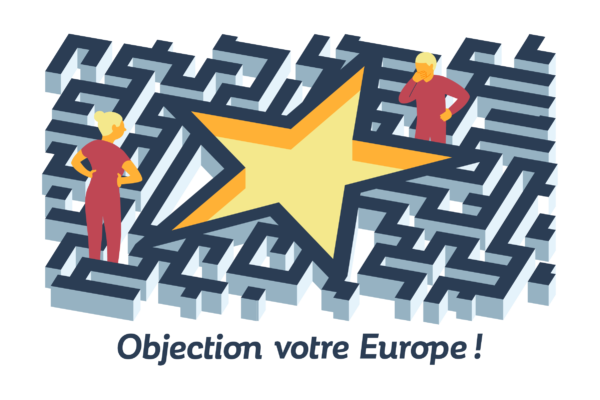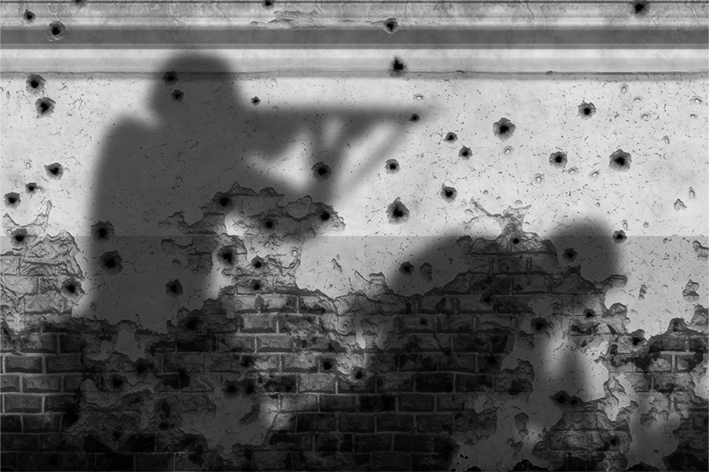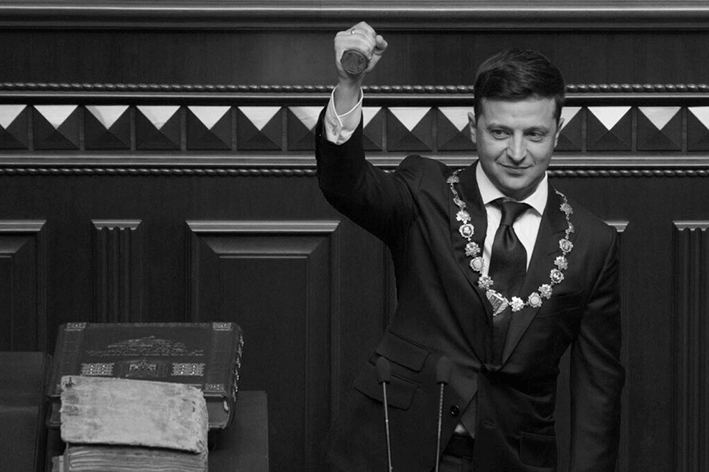StopFake’s Alina Mosendz: “Disinformation lays the ground for war”
Dernière modification : 8 mars 2022
Propos recueillis par Vincent Couronne, directeur des Surligneurs
Transcription : Enzo Villet et Eva Taleb
Journalist at StopFake, a Ukrainian media specialized in the fight against disinformation, Alina Mosendz spoke with Les Surligneurs about how dramatic the situation is, and the extent to which the Russian propaganda machine has been preparing. She warns Europeans of the consequences of disinformation.
For security reasons, Alina Monsendz warns us that she cannot give any information about her whereabouts or that of fellow journalists. This is what it has come to in Ukraine. All because the media she has been working for over the past eight years is a thorn in Vladimir Putin’s side: StopFake is a Ukrainian media that specialises in fact-checking, the fight against disinformation. Ever since it started in 2014 within the walls of the National University of Kyiv-Mohyla Academy, they have been striving to counter Russian propaganda that itself has been seeking to prepare Russians, Ukrainians, and perhaps even Europeans, for war. Her experience with StopFake in Ukraine has taught her a vital lesson: disinformation is a weapon of war.
Vincent Couronne: What is the situation now for the media in Ukraine?
Alina Mosendz: First of all, there are seven TV channels that are now making a common news marathon. I know some journalists, especially those with small kids, needed to go to a safer place, but those journalists who are staying, are working together, but also those from a distance helping to inform about the news non-stop. Therefore, they can get information better and be on one line, instead of repeating the same things. In Ukraine, we used to have at least four pro-Russian media and a few big websites, three TV channels of which were affiliated with Viktor Medvedchuck, proxy of Vladimir Putin. They were banned from broadcasting before the big war. Yet for the moment they are not in this marathon or in unity of Ukrainian TV channels.
Also, there are good outlets who are still informing about what is happening. As far as I can observe, journalists are still working hard. StopFake keeps working 24/7. At the same time, a lot of journalists who I know personally, both male and female, needed to take up weapons and put their work on pause. It’s very important to say that they are not ‘press with weapons’. This is more or less what the situation is like.
Vincent Couronne: Would you say that this war has changed your relationship, as a media outlet, with your audience? Do people read you more, or less? Is it harder to access information?
Alina Mosendz: As far as I know, the most of Ukrainians are well covered with the internet and well connected even though Russians are trying to bomb TV towers in downtown of Kyiv and Kharkiv [Editor’s note: since the interview, access to the internet seems a bit harder, with difficulties observed in Mariupol]. About the readers, at StopFake, a lot of readers are starting to report us directly if they are doubting some information and thinking something might be fake, they contact our team directly so the information can be verified.
More than ever people are trying to pay attention and be informed and to not believe in propaganda and fake news
I’ve been working with media literacy for a long time, so I can say that more than ever people are trying to pay attention and be informed and to not believe in propaganda and fake news. And we have to take into account the fact that propaganda does not only spread through Russian TV channels anymore, but also very much through social media now, like Telegram, or Viber chat, also the Russian social media Vkontakte and Odnoklassniki.
Let me give a few really important examples of Russian disinformation.
From last week, it’s important to say that when we received attacks targeting civilians, apartments, apartment buildings, hospitals, and schools, there was no doubt it was Russia who was bombing. However, very quickly, Russia says “that was a Ukrainian missile”, or “that was a Ukrainian tank”. But we know that this is not true because the pieces which are falling on the ground, the colour of the tanks and also the camouflages are the Russian ones (differences between Ukrainian and Russian armies and vehicles can be seen on a video from the Ukrainian Army on Facebook).
Another thing we’re seeing is that there are a lot of ‘diversants’ [saboteur]. For example, Russians soldiers steal uniforms from Ukrainians soldiers, or sometimes even vehicles, and start to do provocations. These are clearly ‘diversant’ groups. But Ukrainians can easily distinguish Russians and Ukrainians, because we do understand Russian, and Russians don’t understand Ukrainian. So, if we say something in Ukrainian they will not be able to understand. There you can see how language can be a useful weapon, for us to discern who is who.
We have videos of people looting shops and those are Russian soldiers going to food shops and taking all the food
Also, for example, there is fake news saying that Ukrainians are marauding, that they are breaking into shops and private apartments. It would be a war crime. But if you think logically, if both the Ukrainian military and civilians are fighting together, there will be no need for them to pillage. There is no rational reason for the military to do so because civilians are supporting and helping them. We have videos of people looting shops and those are Russian soldiers going to food shops and taking all the food. Why? Because nobody among the civilians is going to support them. And this is important because if they don’t have food supplies, they cannot count on civilians because they’re not on their own land.
Another type of frequent fake news at the moment that Russians spread on whatever channel they can is that when they attack a city it quickly capitulates. This is not true, because each city is fighting back as hard as possible, including Kharkiv, Odesa, Kherson, Mariupol. All of those cities, especially along the Black Sea coastline which can be attacked by the navy, or those which can be attacked from the northeast because they, like Kyiv, Sumy, Chernihiv, Kharkiv, keep fighting back, even though the harm is huge.
Vincent Couronne: Would you say that this disinformation plays a role in the war?
Russian disinformation was pushing special narratives
Alina Mosendz: Yes, a lot. We need to go back in time to understand why disinformation plays a role in the war, because when we look at international platforms, they say “nobody was expecting it!”… No guys, we did, we just didn’t know when precisely! Because in StopFake, since March of 2014 and the Maidan Revolution of Dignity, we have been collecting a lot of disinformation. This disinformation was pushing special narratives. For example, since 2014, the Russians have been moving and pushing the narratives according to which all Ukrainians are apparently Nazis, or far right. This is absolutely not true.
In the Ukrainian parliament, we have had two general elections since 2014, and the far right party – who is not “nazi” but nationalist – won only around 5% of votes in 2014, 2% of votes in 2019. Throughout Europe you have so many more far right, or far left parties, both supported by Russians, so when they are saying that there are many far right people in our country, it is completely untrue. And come on, our president is Jew!
Vincent Couronne: Do you think that the goal of this disinformation was to target rather the Ukrainian public opinion or the Russian one?
Alina Mosendz: Both, but mostly Russians, because they were consuming more fake news. Russia Today – now banned in the EU – had been available in Spanish, English and other languages, while local media is in Russian. The Russians were also promoting the narrative that, “Ukraine is just going through a civil war, we have nothing to do with it”, “we haven’t occupied any territory – it belongs to us historically”. A lot of these narratives have been spread these past few years, laying the foundation for what is going on now. They laid the foundations while Putin’s regime is calling what they are doing, not an open aggression, but a “denazification”.
Vincent Couronne: Would you say that, before the current conflict arises, you were thinking that disinformation was a tool for war?
Disinformation lays the ground for war, and also during the aggression
Alina Mosendz: Definitely, yes, I would say that disinformation lays the ground for war, and also during the aggression. I would just like to correct (you) a little bit… I would never call that a ‘conflict’, and there is a reason why. If you look back through our history, for the past around three hundred years, there has always been war between Ukraine and Russia, be it the Russian Empire or the Soviet Union, as we have been trying to get our independence back.
We know that History is written by the victors, and they have been silencing so many wars, so much resistance, and so many insurgent groups which were fighting against both the Soviet Union and Russian Empire. So, this narrative that we are brother nations who speak the same language is simply not true. Nonetheless, both languages are slavic.
The narrative that Ukraine was always part of Russia, that’s not true. Ukraine, in the Soviet times, was forced to join the Soviet Union. How? By the artificial famine, the 1932-1933 Holodomor, which was genocide, and also by Soviet-Ukrainian war of 1917-1921. During the Second World War, some Ukrainians grouped together to try to get away from Soviet dominion.
Russia makes its own history, shapes history in a way that is more convenient for those who are attacking
At the same time, because we were defeated, they – and I’m talking about soviet Russia – were pushing the narrative that all Ukrainian Insurgent Army (UPA) were just Nazis! No, we were fighting against both Nazis and against soviets during WWII. So, yes, disinformation is playing a role in today’s news, in preparing the ground over the past eight years, and in Russia making its own history, shaping history in a way that is more convenient for those who are attacking.
Vincent Couronne: Is there anything that you want to say to other media or fact checkers, in Europe or in the world?
Alina Mosendz: First, it’s not a situation where you can have a balance. If you take information coming from the Russian and the Ukrainian ministry of Defense, you don’t have a balance. It’s quite a different situation. It’s not a conflict between countries, it’s one country invading another. This is very important to understand, because in this case it is a fake balance. The truth is not somewhere in between. You need to understand the situation that we are attacked by another country which only 8 years ago occupied 7% of our territory (Crimea and parts of Luhansk and Donetsk region).
Russian media says that it is a NATO threat, but it has nothing to do with NATO
Second thing, Russian media says that it is a NATO threat, but it has nothing to do with NATO. We are not yet having the status of candidate, but we are aspiring to be in NATO. The desire for membership in the EU and NATO is in our Constitution. There are other countries in Russia’s neighborhood, like Turkey or the Baltic countries, which joined NATO. Was it a threat that necessitated an invasion? No. So please don’t believe the narrative about NATO.
Vincent Couronne: The rest of Europe also suffers from the spread of Russian disinformation, especially during electoral campaigns. Is there any message that you want to tell us?
Alina Mosendz: Watch out from which source comes the information and who can benefit from it. It’s true that lately Russia was trying to impact elections in the US and around Europe. The Kremlin was giving support to some parties, which were promoting in their countries messages benefiting Russia or friendship with Putin.
Don’t help the enemy to correct the fire against our defenders
StopFake is verifying all type of suspicious information 24/7 now. For that you need closely monitor what’s going on, keep in touch with locals, the army, the ministry of defense. Also constantly check the information from Russian media and officials, as they’re denying their losses in this war.
As Ukrainians, we need to rely on official sources, on reports from the President Zelenskyy, the Ministry of Defence, and the General Staff of the Armed Forces. It’s clear that they might not have reported all the information, but it’s very important to see from where you receive your information, from which source, and what interests the source may have. I would add that spreading some information could be just dangerous in the time of war, like locations of the army, or precise addresses, so not to help the enemy to correct the fire against our defenders.
Une erreur dans ce contenu ? Vous souhaitez soumettre une information à vérifier ? Faites-le nous savoir en utilisant notre formulaire en ligne. Retrouvez notre politique de correction et de soumission d'informations sur la page Notre méthode.










